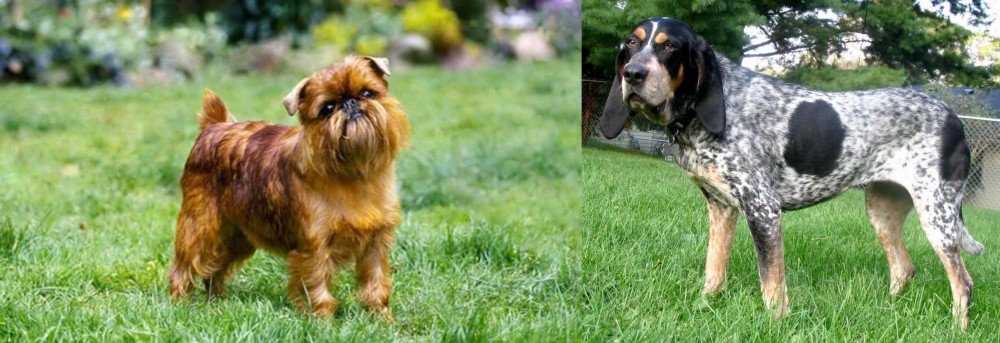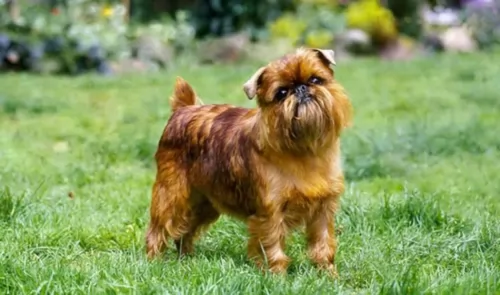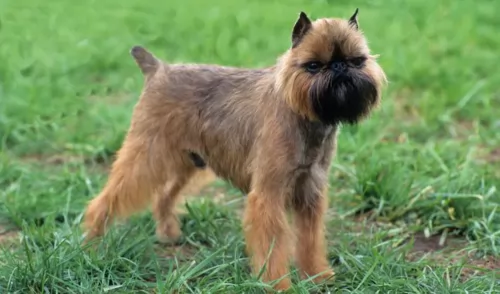 Petzlover
Petzlover Belgian Griffon is originated from Belgium but Griffon Bleu de Gascogne is originated from France. Belgian Griffon may grow 37 cm / 14 inches shorter than Griffon Bleu de Gascogne. Belgian Griffon may weigh 21 kg / 46 pounds lesser than Griffon Bleu de Gascogne. Belgian Griffon may live 3 years more than Griffon Bleu de Gascogne. Belgian Griffon may have less litter size than Griffon Bleu de Gascogne. Both Belgian Griffon and Griffon Bleu de Gascogne requires Moderate Maintenance.
Belgian Griffon is originated from Belgium but Griffon Bleu de Gascogne is originated from France. Belgian Griffon may grow 37 cm / 14 inches shorter than Griffon Bleu de Gascogne. Belgian Griffon may weigh 21 kg / 46 pounds lesser than Griffon Bleu de Gascogne. Belgian Griffon may live 3 years more than Griffon Bleu de Gascogne. Belgian Griffon may have less litter size than Griffon Bleu de Gascogne. Both Belgian Griffon and Griffon Bleu de Gascogne requires Moderate Maintenance.
 The Belgian Griffon isn’t your most attractive dog, but maybe its his quirky, gremlin looks that makes him such an adored pet for many. There are different varieties of Griffon, and the Belgian- and Brussels Griffon are one and the same. All small Belgian dogs have the same breed standards, with the Belgian having a rough coat The dog hails from Belguim and its ancestors were no doubt a mix of the Belgian street dog, the Stable Griffon and the Affenpinscher.
The Belgian Griffon isn’t your most attractive dog, but maybe its his quirky, gremlin looks that makes him such an adored pet for many. There are different varieties of Griffon, and the Belgian- and Brussels Griffon are one and the same. All small Belgian dogs have the same breed standards, with the Belgian having a rough coat The dog hails from Belguim and its ancestors were no doubt a mix of the Belgian street dog, the Stable Griffon and the Affenpinscher.
Later on in the 1800s, this combination was then crossed with the Pug, giving the dog the brachycephalic or flat faced look.
Unfortunately no written records were kept about the precise origin of this breed, but there is also the idea that the King Charles- and English Toy Spaniel were also involved in its development. These small dogs were bred to catch rats in the barns of European estates.
 The Griffon Bleu de Gascogne dog hails from France and is descended from crosses between the Bleu de Gascogne as well as the Griffon Nivernais. Dog experts tell us that the Grand Griffon Vendeen is also part of the mix.
The Griffon Bleu de Gascogne dog hails from France and is descended from crosses between the Bleu de Gascogne as well as the Griffon Nivernais. Dog experts tell us that the Grand Griffon Vendeen is also part of the mix.
Raised as working dogs, with his good nose and alertness, he has always been used as a single hunting dog or being used as part of a pack.
It was in 1920 that the first Griffon Bleu de Gascogne breed standard was written in France, and over the decades, the dog hasn’t changed much in looks except that it is slightly taller.
This is a rare breed not much seen outside of France, but breeding attempts have taken it from ‘close to extinction’ to a popular pet today.The Griffon Bleu de Gascogne was recognized by the United Kennel Club in 1991.
 There are different variations of this dog to give it its distinctive look and size. This quaint looking little Griffon canine comes with two different coat types - soft or wiry. With the Belgian Griffon, his wiry coat of red, tan or black will need to be brushed at least twice a week. Shedding with this dog is seasonal.
There are different variations of this dog to give it its distinctive look and size. This quaint looking little Griffon canine comes with two different coat types - soft or wiry. With the Belgian Griffon, his wiry coat of red, tan or black will need to be brushed at least twice a week. Shedding with this dog is seasonal.
He has a compact, sturdy little body, and he trots around with attitude. With his sharp pointed ears and whiskers, he has been given the nickname ‘bearded dog’. His dark black eyes are alert. He is self-confident, intelligent and curious breed, a great family pet and good with children if he has grown up with them in the home. He is good with other pets. The fact that this is a small breed and that he doesn’t have excessive energy levels, means he is adaptable to city- and country living.
 This is a medium to large sized scenthound. He stands at anything between 48 to 57cms and weighs between 16 and 27kg.
This is a medium to large sized scenthound. He stands at anything between 48 to 57cms and weighs between 16 and 27kg.
He has a long, wiry type of coat which is usually a mottled white and black, taking on a blue hue look. There are tan marking above the eyes and around the muzzle. The ears of the dog are long and floppy, he has that typical soulful look in his brown eyes and the tail is long with a curve at the point.
The Griffon Bleu de Gascogne is an intelligent dog breed, capable of learning quickly and therefore will do well with training and socialization.
This popular docile dog gets on well with other pets in the home as well as with children. He is alert and energetic but is known to be a loyal and loving dog, being good with children, particularly those he grew up with.
The dog isn't particularly well suited to city life simply because of his high energy. He will require a good deal of exercise, so essentially he needs a home with a fair sized garden. He will want to join you on your walks. Walks provide your pet with stimulation and are good for socializing a dog too.
 The Belgian Griffon is an affectionate pet and often establishes a strong bond with one member of the family. You’ll have your Griffon with you for about 15 years so make sure he is trained and a pleasure to have around.They are difficult to train, being somewhat stubborn so they are going to require patience. They’re sensitive too, and they won’t respond well to aggressive treatment.
The Belgian Griffon is an affectionate pet and often establishes a strong bond with one member of the family. You’ll have your Griffon with you for about 15 years so make sure he is trained and a pleasure to have around.They are difficult to train, being somewhat stubborn so they are going to require patience. They’re sensitive too, and they won’t respond well to aggressive treatment.
They’re much more indoor dogs than outdoor dogs because they’re also vulnerable to heat stroke. They just want to come indoors and be with their human family, and when you do that for them, they’ll become a wonderful friend and companion to you.
 Your Griffon Bleu de Gascogne is such a popular pet in France and Spain simply because he is so amicable, getting on well with everyone in the home.
Your Griffon Bleu de Gascogne is such a popular pet in France and Spain simply because he is so amicable, getting on well with everyone in the home.
He is everything that a pet lover wants – loving, protective, friendly and companionable. They get on well with other pets too and they’re easy to train, becoming super obedient. Add to that the fact that he isn’t a sickly dog and is also fairly low maintenance.
This dog has all it takes to make him the most splendid pet.
 When you get your Griffon from a reputable breeder, you always have a better chance that he’ll be healthy. As it is, the Belgian Griffon has few hereditary health issues. However his dark eyes will have some genetic problems to contend with and he could suffer with progressive retinal atrophy. This is an illness which can lead to blindness
When you get your Griffon from a reputable breeder, you always have a better chance that he’ll be healthy. As it is, the Belgian Griffon has few hereditary health issues. However his dark eyes will have some genetic problems to contend with and he could suffer with progressive retinal atrophy. This is an illness which can lead to blindness
Syringomyelia – this is a neurological condition – an abnormality of the spinal cord – a disease which occurs more frequently in small breeds. It can cause your pet to endure a lot of pain.
Birthing Issues - these little dogs often have problems with giving birth, and a vet often has to intervene and perform a cesarean.
 As a healthy dog breed, your Griffon Bleu de Gascogne isn't likely to cost you much at the vet. Nonetheless there are some common dog ailments that you need to be aware of.
As a healthy dog breed, your Griffon Bleu de Gascogne isn't likely to cost you much at the vet. Nonetheless there are some common dog ailments that you need to be aware of.
Some dog owners, when buying a Griffon puppy, want to see health clearance certificates to show that the parents of the puppy are free from the like of certain diseases such as hip dysplasia and von Willebrand's disease.
This is a condition where your dogs thighbone doesn't fit properly into the hip joint. Your puppy can develop this condition from 4 months of age already.
With some dogs you can see the pain, and they may even become lame in one or both back legs. Hip dysplasia is hereditary, but environmental factors such as an injury or the wrong diet can contribute towards your pet succumbing to hip dysplasia.
A skin allergy can make your pet totally miserable as they lick and scratch with discomfort, pain and irritation. All the scratching and licking can cause secondary infections and your pet can even lose his hair.
Atopic Dermatitis is when your dog is allergic to things like dust or pollen. Some people look at homeopathic treatments for dogs and are pleased with the results. The thing is you need to get help for your pet as it can cause your pet endless misery.
 The Belgian Griffon will do well if you invest in high quality foods. You can make your own, but if you’re concerned about his health, it would be best to check what ingredients should go into his home-prepared meals to ensure he gets all the vitamins and minerals he needs.
The Belgian Griffon will do well if you invest in high quality foods. You can make your own, but if you’re concerned about his health, it would be best to check what ingredients should go into his home-prepared meals to ensure he gets all the vitamins and minerals he needs.
If you want to go with commercially manufactured dog foods, check with your vet about wet- and dry foods. Your vet will help with choosing a food appropriate to his size and age. Always ensure that there is clean, fresh water available to your pet.
Even though he is a small breed, he is fairly active and he will need his fair share of exercise like ball games and walks. Training and socialization are a must for him. You’ll notice that training isn’t particularly easy with this breed, and first time dog owners might not have the patience with him.
 The Griffon Bleu de Gascogne is a rough, shaggy, fairly long coated dog and is an average shedder. He will therefore require regular brushing to get rid of grass and burrs that cling to the hair, causing it to matt and tangle.It's always a good chance for you to check him over for ticks and fleas too.
The Griffon Bleu de Gascogne is a rough, shaggy, fairly long coated dog and is an average shedder. He will therefore require regular brushing to get rid of grass and burrs that cling to the hair, causing it to matt and tangle.It's always a good chance for you to check him over for ticks and fleas too.
He has floppy ears, so these will require cleaning to prevent infections. Check his nails too and trim them as needed. Take him to the vet for this if you're not sure how or you don't have the correct grooming tools.
Just like his human family, a dog needs to have his own sleeping spot – a place which is warm and dry and which he can retreat too. It is a good idea to train your dog to sleep in his own place where there are some warm blankets which are clean and comfortable for him.
You chose to bring a dog into your home, and it is therefore your responsibility to see that he is looked after well.
To keep him healthy, he will require high-quality kibble twice a day. How much your Griffon eats will depend on his age and his activity levels. Follow the feeding directions carefully on the packaging to ensure you keep him in good shape.
Remove the boredom of the same food every day by adding in some raw meat as well as cooked chicken, rice and vegetables as a tasty treat. This will keep him alert, healthy and his coat shiny. Fresh, cool water should be constantly available.